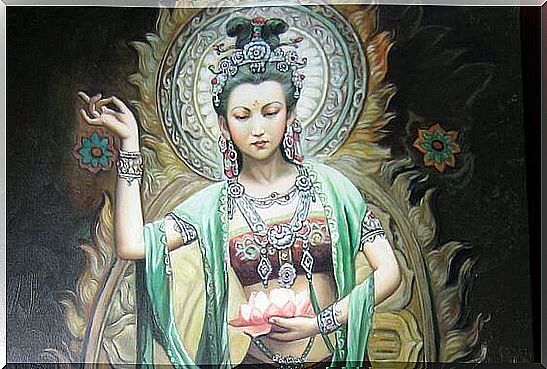Hinduism: How To Find Inner Balance

Hinduism teaches us a way of life and a sense of responsibility in which, at times, silence is our best ally. Therefore, there are things that are best kept secret, aspects concerning our aspirations, essences and successes that belong to our private sphere, to that casket that constitutes the wise personal reserve.
One thing that is said very often about Hindu philosophy is that it is a direct invitation to redefine our existence, to reflect on it through a much broader and, at the same time, responsible prism. The ultimate goal of this religion widespread especially in India and Nepal is to guide the human being on the path of liberation, a place where our thoughts, emotions and words lead us to serenity, to a state of consciousness in which everything is in harmony.
Within these currents of spiritual essence it is very common to find some advice to follow to find the inner balance where well-being or calm dwell. Hinduism represents the essence of various doctrines in which we are told what we should not do, what is best to avoid or limit.
We cannot forget that within this philosophical framework every action has its effect, its consequence. The good Hindu, for example, is the person who knows his duty, his responsibility, that “Dharma” in which material progress has its spiritual transcendence, and the bond that will shape real happiness in this life. and in the next reincarnation. For this reason, it is interesting to know what is best to keep secret, fostering that sense of responsibility with ourselves and with others.
Teachings of Hinduism
1. Gossip, rumors or negative comments about third parties
If someone tells us a gossip, an unpleasant comment about another person, an insulting criticism of someone else’s behavior, the best thing is to overlook it. Hinduism invites us to build a wall that collects negativity and gratuitous insult. At this juncture, it is useful to remember Socrates’ triple filter, that is, if the information that reaches us is neither good, nor useful nor truthful, it is good not to give it importance and relegate it to silence.
2. Our projects
If we have a dream, an ambitious goal, a personal project, we must be cautious. We must not tell others before the hour, we must walk with lead feet and be cautious, better not be hasty. We let the projects mature and almost become reality. Sometimes, when we communicate a desire or a goal, there are those who, far from sharing our enthusiasm, give us their skepticism or, even worse, their criticisms. We must be cautious and keep secret those personal goals that we dream of someday achieving.
3. Our emotional goals: when we were our own heroes
Only we know the battles won, the personal barricades we climbed over to prove to ourselves that we could do it, that we deserved our triumphs. Sometimes the human being is forced to circumvent obstacles in the path that only he is able to understand (a disappointment, a lie, an abandonment, a frustration …), these are events with a refined hardness that have forged us, left their mark but which, in turn, brought out the best in ourselves.
These victories, the most intimate, often belong to the personal sphere. Sometimes, in saying them aloud, they lose transcendence, they are not understood or they are interpreted in the wrong way, as if there are shades of arrogance in our words.
4. Family secrets
The aspects that we must certainly keep secret are the intimacy of one’s home, one’s family, one’s couple. This unique and private fabric belongs only to us; it is about dynamics, inheritances, situations and bonds that should not be shouted from the rooftops as if we were newsboys in the streets.
Only if the situation required it or if the ultimate goal was to receive help to improve the quality of those bonds, we could tell third parties certain things. Either way, we will be careful and choose well the people to whom we reveal those secrets.
5. Our good deeds
Another aspect of our life that is best kept secret, according to Hinduism, is our good deeds, our noble deeds. Goodness doesn’t need spectators, good deeds don’t need to be advertised in banners or neon lights, nor would they be less real if there were no gazes watching us.
True goodness is that which is not seen but which is practiced discreetly on a daily basis with actions that make a difference, in large companies and in the most anonymous situations.
6. Our shortcomings
There are people who become obsessed with what they lack, obsess over what they don’t have and are unable to see the wealth they possess by being able to count on their best qualities.
Let’s avoid it because another thing that’s best kept secret is what we don’t have. If we don’t own a high-end mobile phone, let’s keep it to ourselves, we may be facing someone who can’t afford one. If we lack a partner, the house of our dreams, if we can’t afford the holidays this year, let’s not complain, let’s not proclaim it as if this lack were the cause of absolute unhappiness.
Sometimes, we complain about not having things that are not really vital.

To conclude, as we have seen, Hindu wisdom gives us advice that, in one way or another, we have all thought about at least once. In reality, it is only a question of applying that art so satisfying that it is increasingly scarce: prudence, confidentiality and respect for others.
So, let’s not forget that, as this ancient religious knowledge teaches us, every action has its consequences. So let’s try to be a little more reflective and understand that silence, sometimes, is the perfect place to keep certain words, certain dreams and thoughts.









